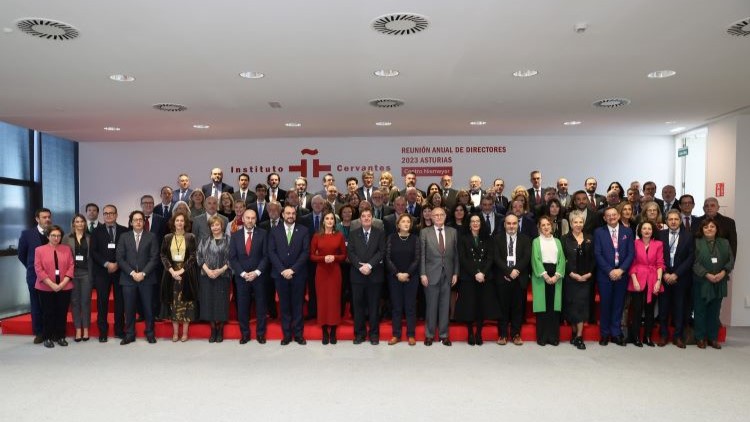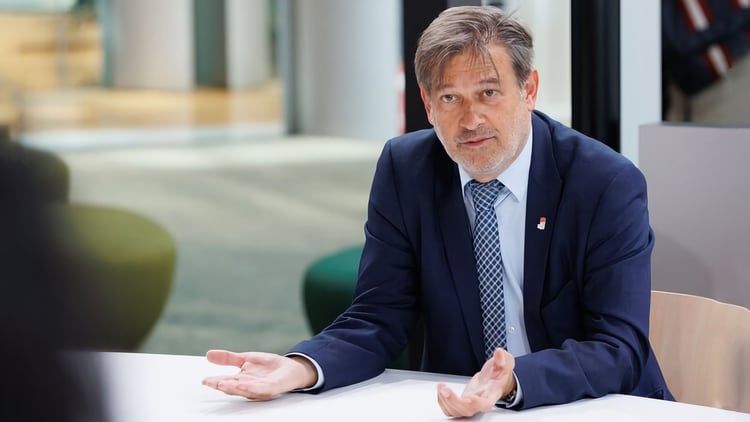Eduardo González
Yesterday, Queen Letizia chaired a work session in Avilés (Asturias) with more than 80 officials from the Instituto Cervantes around the world, whom she encouraged to continue progressing in the “very relevant” role they play for Spain and for cultural diplomacy.
The Instituto Cervantes celebrates this week in Asturias (specifically in Oviedo, Gijón and Avilés) its Annual Meeting of Directors, focused on three specific objectives: taking stock of the work they do to promote Spanish and its culture throughout the world, studying and sharing experiences between officials spread across the five continents, and agree on projects and “future lines related to the democratic commitment” that set the institution’s strategy for the coming years, as advanced by the director of the Institute, Luis García Montero, during the inauguration, which took place on Monday at the La Laboral Theater in Gijón.
The Queen participated yesterday in a work session, in which she highlighted “the importance of the role of all directors” in the face of “the enormous institutional complexity behind the Instituto Cervantes”, which requires “so much effort, resources, will politics and united forces, so that things improve, so that this Strategic Plan is developed and so that all the conditions of you and all the teams in all the countries improve.”
“I hope that the meetings go well, that they are useful and that you continue to progress on this path of improving what your work means,” she continued during the closed-door session, as stated by the Cervantes Institute in a press release. “And that, when you return after these holidays to your centers, to your countries, to that fight that you have every day, you continue to find the energy and strength necessary for that very relevant role that you have for Spain, for Spanish cultural diplomacy and so that our culture spreads throughout the world,” she concluded.
During the session, the situation of Spanish and its culture in the world was addressed, as well as various initiatives or strategies successfully undertaken by the centers in Bremen (Germany), Bucharest (Romania), Warsaw (Poland) and Brasilia (Brazil) and that They have improved their management and results. The meeting was held at the Niemeyer Center in Avilés.
Mrs. Letizia arrived accompanied by the still State Secretary for Ibero-America and the Caribbean and Spanish in the World and president of the board of directors of the Institute, Juan Fernández Trigo, who is going to be the next ambassador of Spain in Lisbon (Portugal).
The president of the Principality of Asturias, Adrián Barbón, was waiting for the Queen; the president of the General Board of the Principality, Juan Manuel Cofiño; the Government delegate, Delia Losa Carballido; the director of Cervantes, Luis García Montero, and the general secretary of the Institute, Carmen Noguero, as well as the deputy minister of Culture, Vanessa Gutiérrez; the mayor of Avilés, Virtudes Monteserín, and the director of the Niemeyer Center, Carlos Cuadros. The Queen also greeted all the directors of the Cervantes Institute, one after another, who then posed with her and other authorities for traditional family photos, in the emblematic building designed by the Brazilian architect Oscar Niemeyer and inaugurated in 2011.
.
The closing of the day in Avilés was provided by the Asturian singer-songwriter Víctor Manuel, who gave a legacy to García Montero so that, upon his return to Madrid, he could deposit it in the Caja de las Letras at the headquarters of the Instituto Cervantes. The Asturian artist offered an acoustic performance in the Niemeyer Center auditorium.
Today’s work, Wednesday the 20th, will take place in Oviedo and will include the presentation, at the University of Oviedo, of the report on the current state of the corpora in Spanish. After the greetings from García Montero and the rector, the special commissioner for the Alliance for the New Language Economy, Cristina Gallach, and the director of the Global Observatory of Spanish, Francisco Moreno, will speak in the Aula Magna.







